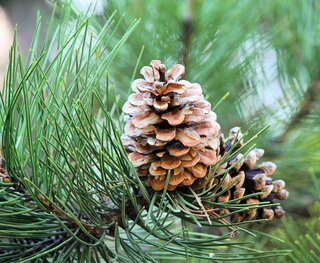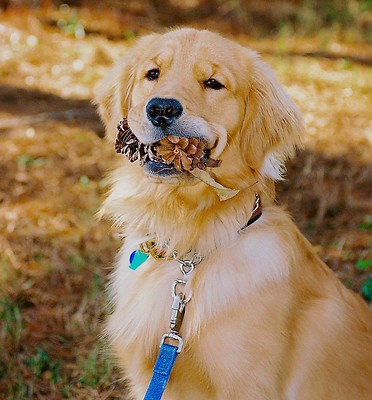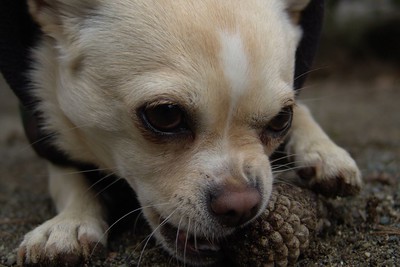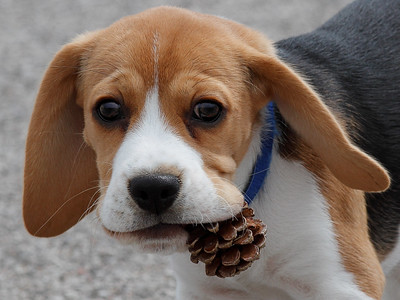As dog owners, we are perplexed by our canine companions’ preoccupation with pine cones, which is one of many peculiar behaviors exhibited by our furry buddies. Pine cones, the tree’s reproductive organ, take the form of a woody cone and are topped by a ring of bracts.
The pleasant aroma of Pine cones comes from volatile oils called terpenes, which are attracting for dogs. However, ingesting or chewing on pine cones is dangerous for your dog’s digestive system and can cause serious problems like internal bleeding and bowel obstruction.
No matter how excited your dog is to play with a pine cone, it is not a suitable chew toy or a pleasant treat. Let’s discover the behavior of dogs on eating pine cones and the potential health risks associated with doing so.
Are Pine Cones Dangerous For Dogs?
Pine cones as well as other components of pine trees can be extremely harmful to dogs and frequently cause symptoms that require immediate medical attention.
Listed below are some ways in which pine cones might be harmful to dogs:
- Digestion problems are a common side effect of pine oil.
- Allergens in the sap are highly prevalent.
- Also, the sap has a high adhesive potential.
- Pointed tips guard the pine cones.
- Pine cones present a serious choking hazard if ingested.
- If swallowed, pine cones can induce an obstruction in the digestive tract.
- Pesticides may be present in pine cones.
- Injuries to the eyes are common from pine needles.
So, having that said, it is good to conclude that pine cones may cause danger for your pooch.
What Is A Pine Cone?

Pine cones generally come from pine trees. The tough and woody are female seed-bearing cones and the spirally arranged scales are part of its structure. To be clear, that pine cone is a female. Female pine cones have a woody exterior, but male cones are mushy and spongy. It’s because male pine cones don’t last as long and are much smaller than their female counterparts.
Are Pine Cones Edible For Dogs?
Obviously, pine cones have parts that may be detrimental to a dog’s health. Although it is safe for dogs to consume it, you should not allow your dogs to eat pine cones. Take note that toxic substances are present in pine cones and they are also a choking hazard.
Do Other Animals Eat Pine Cones?
Aside from dogs, there are other animals that munch on pine cones. Under conifer trees, you can sometimes find the telltale ‘cores’ and stacks of striped scales left by grey and red squirrels as they feast on pine cones. Crossbills and woodpeckers are some of the many species of birds that strip pine cones for food.
Where Can Dogs Stumble Upon Pine Cones?
Dogs may find pine cones in a variety of places aside from the forest floor or under pine trees. Pine cones are a popular seasonal decoration used by many people. The utilization of pine cones is common within tree and flower bed mulch. Small children also make fall and Halloween crafts using pine cones at school.
What Is Pine Tree?

Evergreen trees with long needles and pine cones are called pines. They inhabit both tropical and boreal locations worldwide. Pine trees can withstand harsh winters because they have developed to thrive in sunny locations and have a thick bark that acts as insulation. A thin sheath of dead cells lies beneath the bark to keep the tree warm.
Is Pine Cone Poisonous to Dogs?
Dogs aren’t at risk of poisoning from eating pine cones, but the sap can be dangerous. Having your dog ingest the sap is a surefire way to make them sick to their stomach. If your dog begins to vomit, don’t hesitate to get him or her to the clinic.
Is Pine Cone Tree Poisonous to Dogs?
Although fir tree pine needles are not toxic to dogs, it’s still not a good idea to give them to your pet to gnaw on. These needles aren’t deadly, however, they present a hazard to your dog due to their sharpness and may cause some discomfort in the dog’s throat, digestive tract, and intestines.
You should also know that pine trees and pine cones may include traces of chemical fertilizers if they came from a non-organic source. Another reason to keep your dog away from pine cones and needles.
Is Pine Cone Sap Poisonous to Dogs?
At some point, yes! Pine sap or pine oil can upset a dog’s digestive tract if ingested in sufficient quantities. It has a negative impact on their ability to eat and may cause some mild depressive symptoms.
Why Do Dogs Eat Pine Cones?
Pine cones satisfy the natural curiosity of canine companions. Pine cones may pique a dog’s curiosity because of their scent or feel.
In the same way that humans learn about food by tasting and smelling it, dogs investigate pine cones by sniffing, licking, or chewing them.
What To Do If My Dog Ate A Pine Cone?

Dogs adore eating stuff. They often vomit or poop the questionable content. Because that’s not always the case, it’s risky when your dog didn’t.
Pine cones or bits can get stuck in a dog’s stomach or intestines so ingesting one could be fatal.
Esophagus or throat obstructions might occur. Only induce vomiting if your vet advises.
Your dog might need an Endoscopy. Endoscopy, a telescopic camera with an instrument to extract the pine cone. If endoscopy is not possible, surgery may be necessary.
What Can Happen If My Dog Ate A Pine Cone?
While pine cones themselves aren’t dangerous to canines, there are some things to watch out for before letting Fido dig in.
Scales of Pine Cone Can Splinter Parts of Body
Pine cones feature pointed tips that are capable of penetrating a dog’s mouth, throat, or stomach, depending on the location of the point.
Dog Can Choke on Them
Pine cones could be choking for both humans and dogs when they are swallowed. Small and medium-sized dogs shouldn’t be given the narrower ones since they could choke. the scales on mature pine cones are so easily broken off making them a choking hazard, especially to puppies.
Stomach Irritation
Ingestion of even a small amount of pine cones can cause severe stomach distress which can be agonizing for your beloved pets.
Pine Cone Sap Can Cause Gastro Irritation
Pine cones pose a serious health risk to dogs. Most dogs experience loss of appetite and vomiting as their primary symptoms. It is also possible for a dog to experience gastrointestinal disturbances like constipation or diarrhea.
Intestinal Irritation
In the event that the dog is successful in ingesting a pine cone, there is a possibility that he will be unable to digest it. An irritation of the intestine and a potentially life-threatening obstruction could be caused by the pine cone if it were to become lodged in the dog’s digestive tract and cause it to become stuck there.
Allergic Reaction
Pine oil could trigger an allergic reaction to dogs that are predisposed to developing such reactions.
How to Recognize My Dog Ate A Pine Cone?

If you receive an immediate alert, it is imperative that you take your dog to the vet immediately for evaluation. If your dog has eaten pine cones, you may notice some of the following symptoms:
Loss of Appetite or Energy
Loss of appetite is one of the signs of this ailment, along with the other symptoms. In the event that your dog, who used to get overly thrilled whenever it saw food, no longer does so, this should serve as a warning indication.
Swelling of Throat
A common symptom of a dog getting sick from the pine cone is a swollen throat from the sap creating irritation. Swelling under the dog’s tongue or difficulty swallowing could be the first sign of a problem.
Vomiting
It’s also possible that many dogs will throw up after eating pine cones because of the choking hazard they present. Pine cones have a savory flavor that is appealing to the dog’s sense of taste. So, it’s also possible that many are attracted to its smell as evidenced by the fact that many canines enjoy eating them.
A Lot of Drooling
Your dog’s drooling isn’t only bothersome. This is an extremely alarming sign that requires prompt medical attention. While there are numerous possible causes, ingesting pine cones has been suggested as a primary contributor.
Signs of Diarrhea
The presence of pine cone fragments in the feces is suggestive of diarrhea. Watery, yellow, or mucus-like diarrhea or bowel movements are the most prevalent manifestation of this illness.
Excessive Drinking or Urinating
Dogs showing symptoms of pine cone toxicity may drink more water than usual or urinate in unsuitable areas. Pine cone poisoning can cause symptoms like increased urination, weakness, and loss of appetite in dogs.
How to Make My Dog Stop Eating Pine Cones?
If you want your dog not to eat pine cones, here are some ways for you to do to stop that behavior:
- Do not strike or spank your dog if it eats or chews something it shouldn’t.
- Don’t text or call on dog walks. You can’t see your dog if you’re distracted.
- Nighttime walks with your dog require a flashlight, collar light, or cap light.
Outside with your dog? Distract him from the pine cones with some of his other favorite toys.
Why Are Some Dogs Obsessed with Pine Cones?
As a result, pinecones were often a source of amusement, chewing, or even consumption whenever they were encountered.
There’s a fair chance they’re drawn to the pine sap because of its enticing aroma, prompting them to wonder whether it would constitute a tasty snack or amusing plaything. Keep in mind that, as I mentioned up there, dogs tend to be naturally inquisitive and interested in just about anything. They just can’t help it…
How To Prevent Dogs From Eating A Pine Cone?

Dogs who enjoy playing outside with pine cones might be discouraged from doing so in various ways.
Outside with your dog? Distract him from the pine cones with some of his other favorite toys. If they can concentrate on a tennis or rubber ball, they may not see the pine cones. In addition, have your pet learn basic commands like “drop it.” This command can come in handy whenever your dog has something in its mouth that you don’t want it to eat.
Can Dogs Simply Chew On Pine Cone?
Dogs that don’t have food allergies shouldn’t have any problems if they munch on pine cones. Pine cones might be about the right size for dogs, and their bumpy, interesting surface might be just the thing to entertain them. They come in a variety of shapes and sizes, from balls to oblong bones that dogs can easily hold in their teeth.
Dogs may be enticed to investigate the source of a rattling noise by the seeds within a pine cone and may try to pry it apart to get at the treats inside. In general, pine cones might look like a great dog toy. But there are a few reasons why you shouldn’t let your dog gnaw on pine cones.
Are There Any Safe Use For Pine Cones?
Needless to say, pine cones play a crucial role in protecting the seeds they contain from the freezing temperatures of winter. The seeds within a pine cone are protected by a series of scales that can seal securely. It’s effective at warding off frost, wind, ice, and even some of the animals that would otherwise feast on pine cone seeds.
Border Collies And Pine Cones
It can be terrifying to see your Border Collie scarfing down something that isn’t food. It’s reasonable to wonder why they’re putting their health at risk in this way and what the heck they’re thinking. This is a concern shared by many, so please don’t feel bad about it.
There are a lot of people who own Border Collies who state that their dogs will consume items that they aren’t supposed to.
Surveillance data from over 600 Border Collie owners shows that 37% of those people say their dog will eat whatever it comes across.
For whatever reason, your Border Collie has developed a disorder called pica and is eating non-food items such as dirt, grass, dung, and even pine cones. This is a behavior that most dogs exhibit instinctively. Stress, anxiety, poor diet, boredom, and even physical illness are common behavioral contributors to this syndrome.


